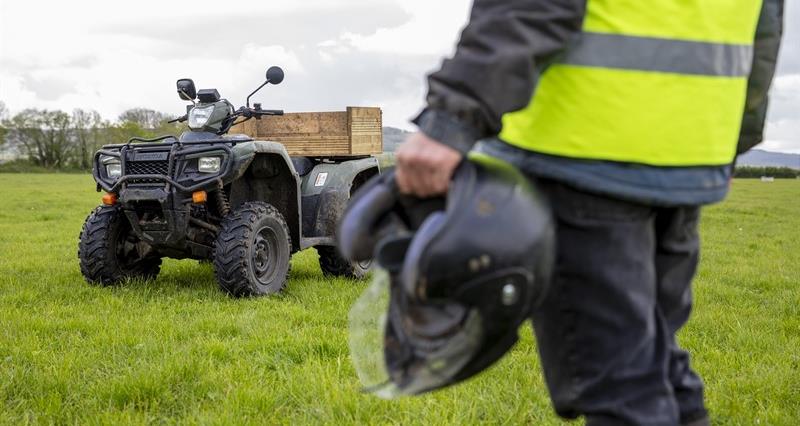Every year, thousands of people suffer life changing injuries or long-term illnesses because of working in agriculture.
Injuries can range from bruising to breaking bones and losing limbs; an average of 11,000 people suffer non-fatal injuries in agriculture, and these can contribute to long term musculoskeletal ill health.
Musculoskeletal ill health accounts for nearly half of all work-related ill health in agriculture. This can range from short-term issues such as pulled muscles, to long-term issues such as arthritis.
These can be prevented by any actions that will reduce the risk of injury, such as lifting appropriately and minimising risks from trip hazards.
‘Take care of yourselves’
The NFU spoke to a former rural GP with experience of treating farmers who gave the following advice: “Farmers are a very reluctant and stoical group when it comes to asking for help.
“All too often illnesses are downplayed until they are too difficult to ignore, when it is possibly too late. Often any visits to a GP are for an immediately debilitating issue, something that warrants an A&E visit.
“Take care of yourselves, look after your physical and mental wellbeing to help ensure you are able to keep farming.”
“The question is asked why many of those working in agriculture are not taking better care and thoughts such as fear of the consequences and worry about management of the farm often come to mind.
“Taking care of your health, such as good diet management, taking proper precautions, such as PPE use, and treating health issues early, can allow many to keep farming for much longer than if the health issues are ignored.
“GPs are often aware of the frustrations of waiting for a callback when there is a busy schedule – simply asking when the call back will be, can help manage your ability to speak to the GP.
“The one message I give to farmers is – take care of yourselves, look after your physical and mental wellbeing to help ensure you are able to keep farming.”
An average of 12,000 people suffer with work related ill heath in agriculture.
Illnesses can range from respiratory diseases such as:
- Farmers lung, from exposure spores from mouldy grain, hay, and straw.
- Silicosis, from exposure to silica dust.
- Asthma, from exposure to dust – agriculture has the highest incident rate compared to occupational rates in other industries.
- Asbestosis, from exposure to asbestos.
Chemical exposure
Every aspect of agriculture now involves some exposure to chemicals, whether it is from:
- fertilisers
- insecticides
- herbicides
- fungicides
- disinfectants
- animal health products.
These chemicals can affect many aspects of your physical health from minor skin irritation to long term respiratory damage and possible damage to DNA from carcinogenic substances.
These effects can resonate throughout your life and into future generations.
How to stay safe when using chemicals:
- Read the datasheets. Datasheets provide all the information required to stay safe when using chemicals.
- Have appropriate training in use of the chemical and equipment use.
- Use appropriate PPE designed for use when handling chemicals.
- Use and have training in appropriate respiratory equipment.
- Keep a barrier between yourself and the substance, be it protective clothing or a closed tractor cab.
Find out more at HSE.GOV.UK | Working with substances hazardous to health.
Zoonoses
For any farmer managing live animals or birds, the risk of zoonoses is ever present.
Zoonotic diseases can present a risk to the animals, as well as the farmers managing the animals.
Training on the management of the zoonoses is good way to help prevent the spread of zoonotic diseases from infected animals to humans. Different zoonotic diseases will require different levels of PPE use to assist with preventing the spread from animals to humans.
Good hygiene practices are also vital to keeping you safe and well on farm.
Training opportunities
Training is a vital part of staying safe and compliant in agriculture and is a compliance requirement under the Provision and Use of Work Equipment Regulations.
There are many platforms available to complete this training.
Lantra provides a wide range of free and fee-paying courses in the form of both e-learning and on-site courses. Lantra accredited training providers are vetted to ensure a high standard of training is provided with specific elements of the trainings covered.
Lantra CEO Marcus Potter said: “Anyone who works in agriculture appreciates that the workforce faces potential dangers on a daily basis.
“Lantra’s mission is simple – to develop and deliver training that helps minimise those risks. We believe that building skills is fundamental if people are to work safely and productively, and that any farming business should see training as an investment, not a cost to remain competitive.
“Whether you are just starting out in farming or looking to develop your career, we encourage you to always look for accredited training.”
Free courses include:
- Keeping children safe on farm.
- Non-technical skills in farming.
- Mental health in agriculture.
E-learning courses include:
- Agriculture health and safety: how to meet your legal responsibilities.
- Health and safety on farms.
- Introduction to agricultural vehicles.
On-site courses include:
- Tractor driving.
- ATV driving.
- Trailer driving.
- Forestry.
- Livestock handling.
Many regional training companies are affiliated with Lantra to provide accredited trainings, such as:
- One Ash Training, based in Northwest providing agriculture and forestry training.
- Tuppco, based in Gloucestershire, provides a wide variety of agriculture, construction and forestry courses, including first aid.
TIAH (The Institute for Agriculture and Horticulture) provides training opportunities to its members.
Agricultural colleges and universities provide training opportunities and many of these are accessible through Lantra.
ATVEA provides free online training for using an ATV.
With the purchase of any new or used ATV from many dealerships, free or subsidised EASI (European ATV safety institute) training is offered.
Health and safety consultancies such as NFU Risk Management Services can provide other courses essential to keeping safe on farm, such as first aid courses.
Other training providers are available including:



